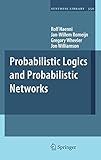Probabilistic Logics and Probabilistic Networks / by Rolf Haenni, Jan-Willem Romeijn, Gregory Wheeler, Jon Williamson.
Tipo de material: TextoSeries Synthese Library, Studies in Epistemology, Logic, Methodology, and Philosophy of Science ; 350Editor: Dordrecht : Springer Netherlands, 2011Descripción: xiii, 155 páginas recurso en líneaTipo de contenido:
TextoSeries Synthese Library, Studies in Epistemology, Logic, Methodology, and Philosophy of Science ; 350Editor: Dordrecht : Springer Netherlands, 2011Descripción: xiii, 155 páginas recurso en líneaTipo de contenido: - texto
- computadora
- recurso en línea
- 9789400700086
- B67
Springer eBooks
Preface -- Part I: Probabilistic Logics -- 1. Introduction -- 2. Standard Probabilistic Semantics -- 3. Probabilistic Argumentation -- 4. Evidential Probability -- 5. Statistical Inference -- 6. Bayesian Statistical Inference -- 7. Objective Bayesian Epistemology -- Part II: Probabilistic Networks -- 8. Credal and Bayesian Networks -- 9. Networks for the Standard Semantics -- 10. Networks for Probabilistic Argumentation -- 11. Networks for Evidential Probability -- 12. Networks for Statistical Inference -- 13. Networks for Bayesian Statistical Inference -- 14. Networks for Objective Bayesianism -- 15. Conclusion -- References -- Index.
While probabilistic logics in principle might be applied to solve a range of problems, in practice they are rarely applied --- perhaps because they seem disparate, complicated, and computationally intractable. This programmatic book argues that several approaches to probabilistic logic fit into a simple unifying framework in which logically complex evidence is used to associate probability intervals or probabilities with sentences. Specifically, Part I shows that there is a natural way to present a question posed in probabilistic logic, and that various inferential procedures provide semantics for that question, while Part II shows that there is the potential to develop computationally feasible methods to mesh with this framework. The book is intended for researchers in philosophy, logic, computer science and statistics. A familiarity with mathematical concepts and notation is presumed, but no advanced knowledge of logic or probability theory is required.
Para consulta fuera de la UANL se requiere clave de acceso remoto.


